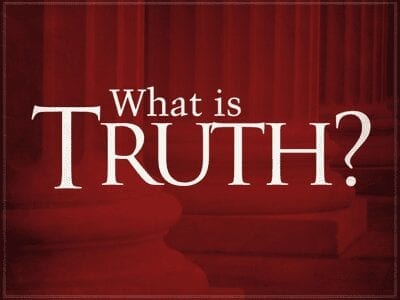This website is dedicated to helping people of every belief come unto a thorough, experiential knowledge of the truth (1 Tim. 2:4).
“What is truth?” That is the question Pontius Pilate asked rhetorically as he turned away from the battered and bloody man standing before him, The Man who was, and still is, the Answer to that question.
In today’s world (especially Europe, but also the USA to a lesser but still very significant extent), the very concept of truth itself is being dismissed by many who are caught up in “postmodern” thinking. This mindset holds that “truth” is only a construction by the culture or the individual, so that what may be true for one is not true for another. Thus, truth is relative. Necessarily, the meaning of words is not fixed, but a function of interpretation, so that each person can construct his own meanings for them. Adhering to that fallacy leads only to external chaos and internal emptiness.
What is truth? An English dictionary says: “That which is in accordance with fact or reality; that which actually is.” In Scripture, the Greek word translated “truth” is aletheia, which means “the revealed reality, or the essence, of something.” That is, what you see is what you get.
The answer to the question posed by Pilate, and all others in the course of human history who have asked it, is two-fold: doctrinal and practical, or propositional and relational. Jesus gave us both sides of the answer by saying, “your word is truth” (John 17:17) and, “I am…the truth” (John 14:6).
Choosing to give mankind His written Word as the blueprint for life, and to give His Son, the living Word, as an example of how to live it, God designed truth to first be grasped by the human mind. But He desires that it go deeper than that, and be held in the human heart, as per Psalm 51:6: “Surely you desire truth in the inner parts; you teach me wisdom in the inmost place.”
God wants people to be true, that is, that the truth within is evidenced by one’s words and deeds. “Dear children, let us not love [only] with words or tongue but with actions and in truth (1 John 3:18). The following verse contains a remarkable phrase:” This then is how we know that we belong to the truth… (1 John 3:19a). God’s goal for each of His children is that we belong to the truth. That means that we are held by it, as it were. It “owns” us because we have freely given our hearts to it.
Ephesians 4:15 is perhaps God’s most poignant plea as to how He wants us to relate to the truth. Unfortunately, it is mistranslated in nearly every Bible version, as follows: “Instead, speaking the truth in love, we will in all things grow up into him who is the Head, that is, Christ.” In the Greek text, there is no verb for “speaking.” The grammatical construction appears only one other place in the Bible (Gal. 4:16—“Have I now become your enemy by telling you the truth?”), and is more accurately (though awkwardly in English) translated “…truthing it…” Again, God’s goal is that we live the truth.
Of course, each person has the choice to relate to the truth otherwise, as Scripture makes clear. Some people “…refuse to love the truth…” (2 Thess. 2:10); some “distort the truth” (Acts 20:30); and some “suppress the truth” (Rom. 1:18). The good news is: “…we cannot do anything against the truth, but only for the truth” (2 Cor. 13:8). And that is our goal on this website—to do something for the truth, to advance it into people’s hearts.
In Matthew 15:1–9 / Mark 7:1–13, Jesus contrasted truth with “tradition.” Replying to the hypocritical Jewish religious leaders who criticized his disciples for failing to adhere to one of the many extraneous requirements they had added to God’s Word, he said: “…Thus you nullify the word of God for the sake of your tradition.”
What is “tradition”? That word is translated from paradosis, which appears 13 times in the Greek text. It simply means “delivering over from one to another.” The context determines whether what was delivered was truth or whether it was the ideas of men that oppose the truth. Ten times it is used in the latter sense, and three times it is used in a positive sense, referring to true “teachings” (NIV) passed on by Paul to others.
As Jesus said, what originates from the minds of men and contradicts the truth “nullifies” the Word of God. That means that believing error does not bring one the benefits of believing truth and may well bring consequences instead. We can deduce the same thing from John 8:31 and 32: “…If you hold to my teaching, you are really my disciples. Then you will know the truth, and the truth will set you free.” What is the converse to that? Wouldn’t it be that believing error puts you in bondage to some degree? Yes, and that is how “tradition” nullifies truth. Truth works in life, traditions don’t.
One more thing to note is the phrase, “the truth,” which appears about 85 times in Scripture. The qualifying article “the” means that there is no other truth. The Word of God is the truth, and thus, in regard to any particular verse, there is one, and only one, true meaning, the meaning intended by the Author. It is up to us to learn and utilize the inherent keys to the Word’s interpretation to arrive at that true subjects meaning.
It is our fervent prayer that something amidst the smorgasbord you find on this website inspires you to dig deeper into the wonderful Word of God to the end that you are more free, and that the quality of your life is enhanced by the truth

